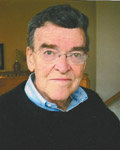November 7, 2014
Max’s Musings
 By Max Molleston
By Max Molleston
Would it be fair to say to ourselves the first indication we had of the sort of poetry we now tend to know is from Psalms of the Old Testament of the Holy Bible? Or, was it from Christmas Carols, once standard fair and plenty of them in church and to some degree in schools, decades ago? Or, from Clement Moore’s The Night Before Christmas? TOO MANY QUESTIONS you might suggest to this writer. I do not intend to work you into reading about any answers I might suggest. On the other hand, I might. The Psalms become the basis for many sermons we hear in sanctuaries we choose.
Book I (one) about man.
He is like a tree
planted by streams of water,
that yields its fruit in its season,
and its leaf does not wither.
In all that he does, he prospers.
That is poetic. It seems neither ancient nor modern as we read it. The words and the phrasing are as contemporary as, at least, the 19th century. Poets who read, and most do and did, had The Holy Bible at their place of worship or within reach. Poetry is much older and widespread than the Holy Bible. It is a story telling source and continues to be. Story tellers were not all poets. Sometimes minstrels sang and their lyrics were arranged to be understood or to help with explanations to
village residents.
On we go!
Part of Psalm 45
My heart overflows with a goodly
theme;
I address my verses to the king;
my tongue is like the pen of a
ready scribe.
This is part of what was advised to the choirmaster as a love song. I am working now from the Revised Standard Version published in 1952, with tips to the parson or choirmaster on the verse origin, if needed or wanted. It is a translation and revision from 1611. Psalms dealt with most forms of humanity and Godliness. Shame and sorrow are included within one of the longer Psalms, 69.
Psalm 69
Thou knowest my reproach,
and my shame and my dishonor;
my foes are all known to thee.
Insults have broken my heart,
so that I am in despair.
I looked for pity, but there was none;
and for comforters, but I found none.
In my time, I have prepared and delivered sermons in my sanctuary and in a few other houses of worship. The great challenge: utilizing the Holy Bible as reference, and as gospel, telling stories developed in the scripture.
Source material is very important to a poet. We have worked with one source. Our own experience is full of ideas and feelings to translate as the poet prefers. Observation, or being keen to what’s visually around us is surely a great source to bring fruit to our imaginations and reinforce our abilities to use words to form poetry. I don’t hold to any condition that may be described as “writers block.” Maybe it applies to writers working on novels and their tendency to hit a dead-end once in a while. My business for four decades was as a broadcaster on radio and television. Journalism works on creative effort that has a deadline to meet. In the final eight years of my work for radio alone, I was responsible for nineteen (19) broadcasts each day, Monday through Friday. All of them must meet a broadcast deadline minutes ahead.
Recently, I completed a booklet on the surrender sequence in the US Civil War. It can be read any time, but the real deadline, the 150th Anniversary close of that war, is April 9, 2015. So, I completed that work well before deadline, with several corrections and some revisions.
We are well on our way to a holiday period for much of America, and I invite your curiosity next month, right here.
Filed Under: Personal Growth
Trackback URL: https://www.50pluslife.com/2014/11/07/maxs-musings-7/trackback/


